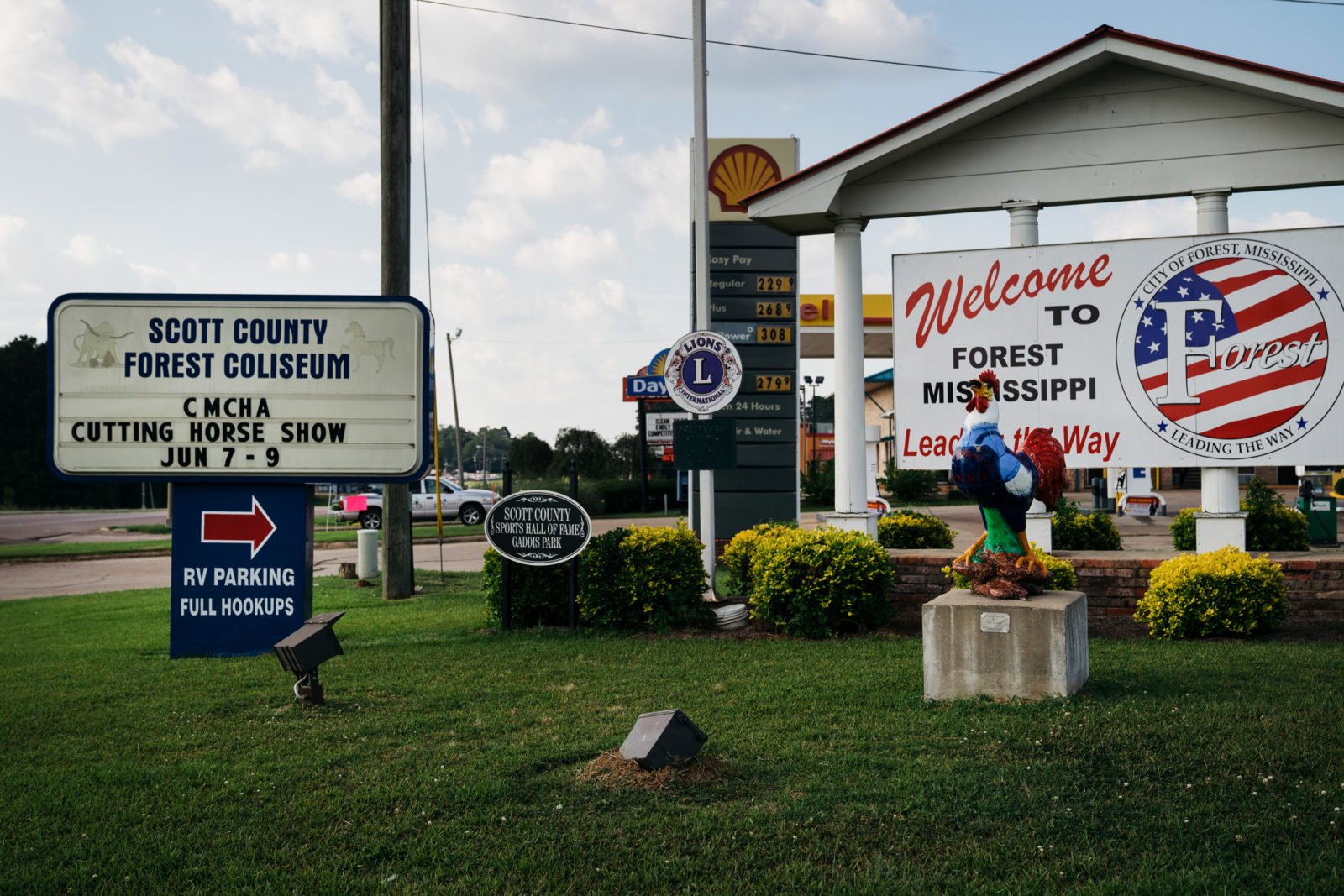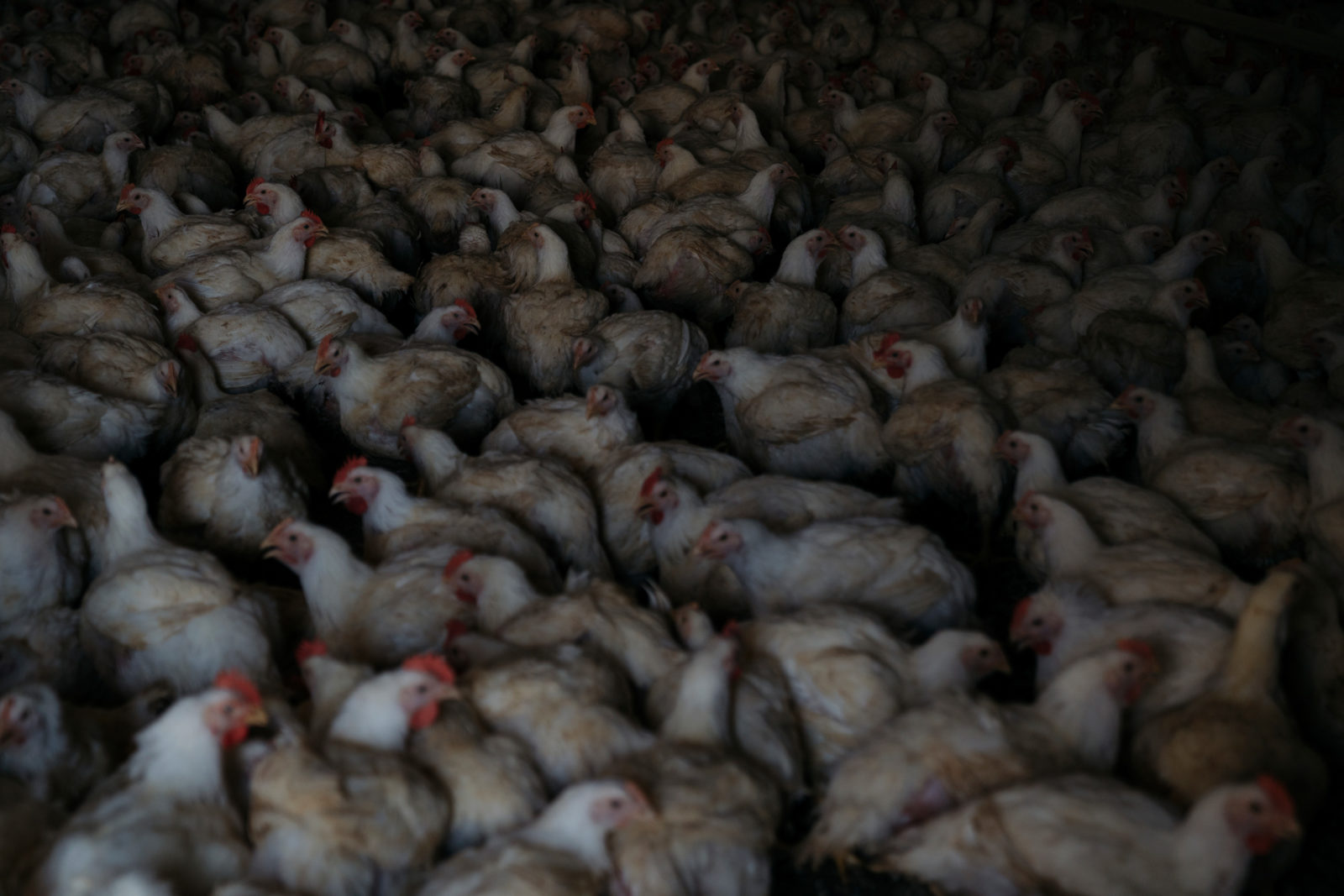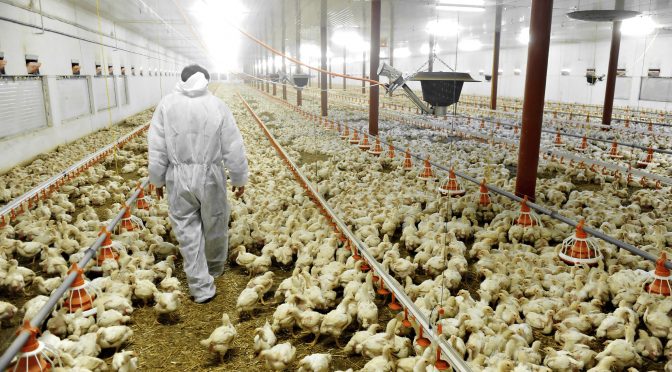The Trump administration has weakened legal protections for farmers and eased off enforcing rules on powerful meat companies.
by Isaac Arnsdorf
After years of working as a sheriff’s deputy and a car dealership manager, John Ingrum used his savings to buy a farm some 50 miles east of Jackson, Mississippi. He planned to raise horses on the land and leave the property to his son.

The farm, named Lovin’ Acres, came with a few chicken houses, which didn’t really interest Ingrum. But then a man showed up from Koch Foods, the country’s fifth-largest poultry processor and one of the main chicken companies in Mississippi. Koch Foods would deliver flocks and feed — all Ingrum would have to do is house the chicks for a few weeks while they grew big enough to slaughter. The company representative wowed Ingrum with projections for the stream of income he could earn, Ingrum recalled in an interview.
What Ingrum didn’t know was that those financial projections overlooked many realities of modern farming in the U.S., where much of the country’s agricultural output is controlled by a handful of giant companies. The numbers didn’t reflect the debt he might have to incur to configure his chicken houses to the company’s specifications. Nor did they reflect the risk that the chicks could show up sick or dead, or that the company could simply stop delivering flocks.
And that growing concentration of corporate power in agriculture would only add to the long odds Ingrum, as a black farmer, faced in the United States, where just 1.3% of the country’s farmers are black.
The shadow of slavery, sharecropping, and Jim Crow has left black farmers in an especially precarious position. Their farms tend to be smaller and their sales lower than the national average, according to data from the U.S. Department of Agriculture. While white farmers benefited from government assistance such as the Homestead Act and land-grant universities, black farmers were largely excluded from owning land and accumulating wealth. In recent decades, black farmers accused the USDA of discriminating against them by denying them loans or forcing them to wait longer, resulting in a class-action lawsuit that settled for more than $1 billion.
Along with these historical disadvantages, black farmers say they have also encountered bias in dealing with some of the corporate giants that control their livelihood. In complaints filed with the USDA between 2010 and 2015, Ingrum and another black farmer in Mississippi said Koch Foods discriminated against them and used its market control to drive them out of business.
After the complaints by the farmers, an investigator for the USDA, which is responsible for regulating the industry, looked into Koch Foods’ dealings with those farmers and found “evidence of unjust discrimination,” according to a 700-page case file obtained by ProPublica. The investigator concluded that Koch Foods violated a law governing meat companies’ business practices.
The Trump administration has cut back on enforcing this law, with the USDA now conducting fewer investigations and imposing fewer fines, as ProPublica has reported. Koch Foods hasn’t faced any penalty.
Koch Foods declined to provide an interview with any of its executives or to answer detailed questions about its dealings with black farmers in Mississippi. A lawyer for the company said it denies wrongdoing.
The five largest chicken companies now make up 61% of the market, compared with 34% in the hands of the top four firms in 1986. As the biggest companies expanded their control, they raised farmers’ average pay by a mere 2.5 cents a pound from 1988 to 2016, while the wholesale price of chicken rose by 17.4 cents a pound, according to data from the USDA and the National Chicken Council.

Mississippi is the fifth-largest poultry-producing state, with more than 1,300 chicken farms. In a state where the population is 38% black, only 96 of those farms were operated by African Americans in 2012, the most recent USDA data available. From 2009 to 2017, Koch Foods went from having contracts with four black farmers in Mississippi to zero.
Koch (pronounced “cook”) Foods is based outside Chicago and supplies chicken, often sold under other brands, to major restaurants and retailers such as Burger King, Kroger and Walmart. The company, which is privately held, is not part of the business empire of the conservative billionaires Charles Koch and David Koch. The owner of Koch Foods, Joseph Grendys, has a fortune that Forbes estimates at $3.1 billion.
After Ingrum signed his contract to grow chickens for Koch Foods, in 2002, different company representatives kept coming with lists of expensive modifications they wanted Ingrum to make, according to an affidavit he provided to the USDA investigator. After Ingrum met all the specifications, the next representative went back on what the previous one said and wanted things done a different way, Ingrum said in the affidavit.
Chicken companies usually say they update their specifications to improve animal welfare or respond to consumer preferences like avoiding antibiotics. But Ingrum couldn’t find much logic in the changes Koch Foods wanted him to make. One service technician directed Ingrum to install lights in one place, the next one someplace else. Another time, the company wanted Ingrum to move a power line, even though it was out of the way of the feed trucks and bins. That cost him $6,000.

According to Ingrum’s affidavit, when he met with a manager about the shifting demands, the manager said, derisively, “I had a couple of y’all when I was at Sanderson,” another big chicken company. Ingrum asked the manager, who was white, what he meant by that. The manager didn’t answer Ingrum. Reached by ProPublica on his cellphone, the manager hung up.
Ingrum suspected that the truck drivers who delivered feed were shortchanging him, so he installed sensors to alert him when the drivers arrived. In 2007, according to his affidavit, Ingrum caught a driver failing to fill a whole feed bin. The company brushed it off as an honest mistake. But Ingrum had heard of drivers asking farmers for payoffs to get more feed, according to the affidavit.
In 2009, Ingrum spent $50,000 on renovations that Koch wanted. Then the company wanted Ingrum to rebuild his compost shed. That was another $5,000. Then Koch Foods said the shed had to be certified by a government inspector. Ingrum called the agency, which said the shed didn’t require approval and they only sent an inspector out once a year.
With Koch Foods delivering flocks to Ingrum’s farm less frequently than expected, he was making less money and falling behind on his loan payments. He looked into selling his farm. When a prospective buyer from Florida called Koch to inquire about a contract with them, a Koch employee scared him off by saying Ingrum’s farm needed $100,000 in repairs, according to Ingrum’s affidavit. The employee also swore at Ingrum’s real estate agent and spread a rumor that the bank had foreclosed, according to the affidavit. That wasn’t true, but it was becoming increasingly hard to avoid.
In 2010, Ingrum heard that the Obama administration was making a push to help farmers who were getting squeezed by consolidation in agriculture. Attorney General Eric Holder and Agriculture Secretary Tom Vilsack were going around the country to hear from farmers about the problems in their markets. When they came to neighboring Alabama to meet with chicken farmers, Ingrum went and spoke on a panel.
At the hearing, Ingrum recounted how the company would pay him less if the birds were sick or underfed, even though the company supplied the chicks and the feed. Ingrum said he’d received a tray of 100 chicks with 35 to 40 already dead. Another time, he ran out of feed for three days and the chickens started eating one another.
“There’s no way it could be fair,” he said at the hearing, according to the transcript. “I had no control over the feed that they brought me.”

That night, when Ingrum returned home to Lovin’ Acres Farm, he found a note from Koch Foods saying his contract had expired.
The USDA investigator later inquired whether it was “solely a coincidence” that Koch Foods left the note at Ingrum’s farm on the same day he attended the hearing 300 miles away. A company supervisor said he “could not say.”
“I never got another chicken after going to that meeting over there in Alabama,” Ingrum, 55, said in an interview. “They put me slap out of business.”
As Ingrum ran out of money, the power company cut his electricity, but he refused to leave for three months. His former colleagues at the sheriff’s office had to come remove him. For the next five years, he stayed with relatives until he scraped together enough money from working at a car dealership to get back on his feet.
“Twenty years, everything I worked for, I lost it in one summer,” Ingrum said. “It just ruined me.”
Around the same time, two other black farmers in the area also stopped growing chickens for Koch Foods. Out of 173 chicken farmers under contract with Koch Foods in Mississippi, there was only one African American left. His name was Carlton Sanders.
Ingrum said he warned Sanders: “They’re coming after you, Carlton. You next.”
Sanders’ farm was in a nearby town called Lena. He had been in the business since 1992. Back then, he worked with a local family business called BC Rogers, which he said always treated him professionally. He used the chicken manure to fertilize his vegetable garden, and he took pride in his trees growing figs, pears and apricots. “I just had everything set,” Sanders said.
When Koch Foods bought BC Rogers in 2001, everything changed, Sanders said. Sanders’ performance was above average, according to the ranking system that the company used to pay farmers. But he felt singled out for disadvantages.
“I’ve never been treated like that by anybody,” Sanders, 63, said. “It was just like I was in hell with them.”

In 2014, Koch Foods wanted Sanders to make $105,000 worth of improvements, according to the USDA case file. Then Sanders borrowed an additional $93,000 to buy new curtains, insulation, cables and heaters. Suddenly, he owed a total of $295,000, but he made his payments on time, according to financial records reviewed by ProPublica.
The next year, Koch Foods informed its farmers of a new requirement for the ventilation in their chicken houses. Sanders went to his bank to see about another loan. The loan officer called the manager at Koch Foods and sent a follow-up email asking for “a listing of needed improvements that Koch Foods is requiring.”
The manager never responded directly to the banker. Instead, the company gave Sanders an “update list” with 23 items. Sanders gave the list to his banker, who understood it to be the company’s response to his inquiry. Sanders obtained work estimates for the 23 updates, amounting to $318,000, according to the case file.
The banker advised Sanders not to apply for another loan and to consider selling his farm instead. Meanwhile, Koch Foods stopped giving Sanders chickens to raise.
Sanders asked around and realized other farmers hadn’t gotten the same 23-item “update list.” So in December 2015, he filed a complaint with the USDA.
The complaint was assigned to a government attorney in Atlanta named Wayne Basford. Basford had also looked into Ingrum’s case, stretching back to 2010. Over the years, Basford had collected affidavits attesting to Koch employees’ calling black farmers “niggers” (the employees denied it), and he observed that the office staff was all white. He also noted that the Equal Employment Opportunity Commission was suing Koch Foods, alleging sexual harassment, retaliation and discrimination against Hispanic employees in Mississippi. (The company later paid $3.75 million to settle the lawsuit, though it did not admit wrongdoing.)
In February 2016, Basford notified Koch Foods that he was investigating a new complaint he’d received, without mentioning Sanders. Koch Foods’ lawyer responded by criticizing the condition of Sanders’ farm and, at the same time, denying that the company asks farmers to make “upgrades.”
As Basford inquired about the 23-item “update list” that only Sanders received, Koch Foods said these were optional. The list used the word “must” six times and never said the updates were voluntary.
“I hate to say it, but they just don’t like black people,” Sanders said. “There are no black people in the office — they don’t even want black people cleaning up after them.”
Basford asked to schedule a meeting with Koch Foods’ executives to present his findings. The company’s lawyer, Scott Pedigo, of the firm Baker Donelson in Jackson, Mississippi, called Basford to suggest meeting with local managers instead, according to emails included in the case file. Basford insisted on speaking with the top executives “due to the potential gravity of the situation.”
In July 2017, Basford and two colleagues from the USDA met in Birmingham, Alabama, with Koch Foods’ chief operating officer, Mark Kaminsky, along with two other executives and Pedigo. Grendys, Koch Foods’ billionaire owner, did not attend, but Basford sent Grendys a copy of his slides.
In the presentation, Basford said Koch Foods’ actions toward Sanders, combined with its treatment of Ingrum and the other black farmers, was “evidence of unjust discrimination.” Chicken companies are prohibited from engaging in “unfair, unjustly discriminatory or deceptive” business practices under the Packers and Stockyards Act of 1921. The Obama administration tried to tighten enforcement of this law by proposing new regulations to spell out what those prohibited practices are. But the meat industry lobbied Congress to block the proposed rules by withholding funding from the USDA. When the Trump administration came in, it swiftly prevented the rules from taking effect.
So when Basford presented his findings to the Koch Foods executives in July 2017, he included all the evidence of discrimination, but he alleged a narrower violation: that Koch Foods failed to notify Sanders of why it stopped delivering chickens to his farm. In response, Pedigo argued that the notification nine months earlier about the new ventilation requirement was enough.

The notice requirement had been strengthened by the Obama administration, but Congress reversed the change in 2015. That made it harder for Basford’s case to stick.
Basford, who declined to comment for this article, submitted the case for the USDA’s lawyers to evaluate possible next steps, such as seeking a fine against Koch Foods. The agency hasn’t taken any action so far. A USDA spokesman said the investigation is “ongoing” and the agency is coordinating with the Department of Justice.
Meanwhile, Basford tried to mediate between Koch Foods and Sanders. In the months following Basford’s presentation in 2017, he pushed Koch Foods to resume delivering chickens to Sanders’ farm so that Sanders could save it from foreclosure.
Pedigo responded with a list of 10 repairs that Sanders would have to make first. Seven were among the 23 fixes that the company had previously insisted were optional.
Basford wanted Koch Foods to assure Sanders that if he spent the money to make the latest repairs, the company would start bringing him chickens again. The company wouldn’t agree.
In the end, all Koch Foods agreed to was “reviewing its policies and programs.” Pedigo told Basford the company has a “commitment to treating all of its independent contract growers equally and with dignity and respect.”
In response to questions from ProPublica about Ingrum and Sanders, Pedigo declined to comment on the specific allegations in Basford’s investigation. In a statement, he said, “Koch Foods applies its standards and expectations to all growers uniformly without regard to race or any other protected status and has never discriminated against any grower on such basis.”
Kaminsky, the Koch Foods COO who attended Basford’s presentation, last October became chairman of the National Chicken Council, the industry’s trade group.
Koch Foods and other top chicken companies — Tyson Foods, Pilgrim’s Pride, Sanderson Farms and Perdue Farms — are fighting multiple lawsuits from retailers, distributors and farmers accusing them of conspiring to fix prices. The companies have denied the allegations. In one of the cases, the Justice Department’s Antitrust Division asked the judge on June 21 to freeze discovery in order to protect an ongoing criminal investigation.
The USDA is now doing fewer investigations like Basford’s. His office finished 1,873 investigations in 2017, the most recent data available, down from 2,588 in 2012. Penalties for violating the Packers and Stockyards Act dropped from $3.2 million in 2013 to as little as $243,850 in 2018, according to preliminary case data on the USDA’s website.
The enforcement office, known as the Grain Inspection, Packers and Stockyards Administration, or GIPSA, was dissolved as part of a department-wide reorganization. The USDA shifted responsibility for enforcing the Packers and Stockyards Act into another division whose primary purpose is helping companies boost sales. The staff in the Packers and Stockyards Division has decreased to 137 from 166 in 2010.

Sanders found himself in a downward spiral after the dispute with Koch Foods. He had a stroke and a heart attack. The bank foreclosed on his farm and he filed for bankruptcy. His wife left him. These days, he’s living on food stamps plus whatever he gets from hunting and fishing.
“I’ve been about as dead as somebody can go without being dead,” he said. “I’m trying to hold my head up, that’s all I can do.”
On Sundays, Sanders passes by his old farm on his way to church. The farm is just sitting there, still up for sale, lying fallow. Sometimes, he takes a long way around to avoid seeing it.
Republished with permission under license from ProPublica.

